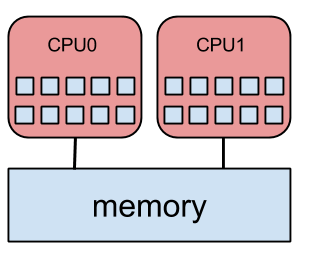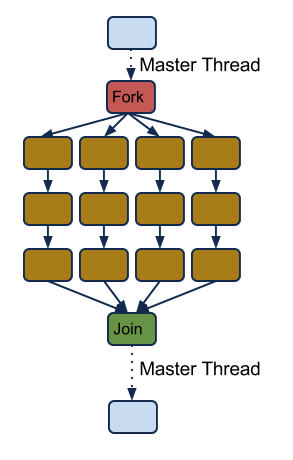| Version 1 (modified by , 10 years ago) ( diff ) |
|---|
OpenMP
- What is OpenMP?
- The OpenMP is an Application Program Interface (API) that supports shared-memory parallel programming.
- What is the shared-memory?
- The memory space that is accessible from multiple CPUs without an operating system call involvement.
- Limitation
- The number of CPUs on a single compute node bounds the number of threads. (←>Distributed Memory Cluster)
A Programmer’s View of OpenMP
- OpenMP is a portable, threaded, shared-memory programming specification with “light” syntax
- Exact behavior depends on OpenMP implementation!
- Requires compiler support (C or Fortran)
- OpenMP will:
- Allow a programmer to separate a program into serial regions and parallel regions.
- OpenMP will not:
- Parallelize automatically
- Guarantee speedup
OpenMP's Execution Model
- OpenMP is built around a shared memory space and generates concurrent threads – this is how the parallelism is facilitated.
- CPUs that share memory are called “symmetric multi-processors”, or SMP for short.
- Each thread is typically run on its own processor, though it is becoming common for each CPU or “core” to handle more than one thread “simultaneously”; this is called “hyper-threading”.
- Thread (process) communication is implicit, and uses variables pointing to shared memory locations; this is in contrast with MPI, which uses explicit messages passed among processes.
- These days, most major compilers do support OpenMP directives for most platforms (IBM's XL suite, Intel, even GCC ≥ 4.2).
- A fork is when a single thread is made into multiple, concurrently executing threads.
- A join is when the concurrently executing threads synchronize back into a single thread.
- During the overall execution, threads may communicate with one another through shared variables.
- OpenMP programs essentially consist of a series of forks and joins.
Brief Tutorials for Programming Languages
Attachments (2)
- CypressNode.png (5.9 KB ) - added by 10 years ago.
- OMPexecModel.png (13.6 KB ) - added by 10 years ago.
Download all attachments as: .zip
Note:
See TracWiki
for help on using the wiki.


